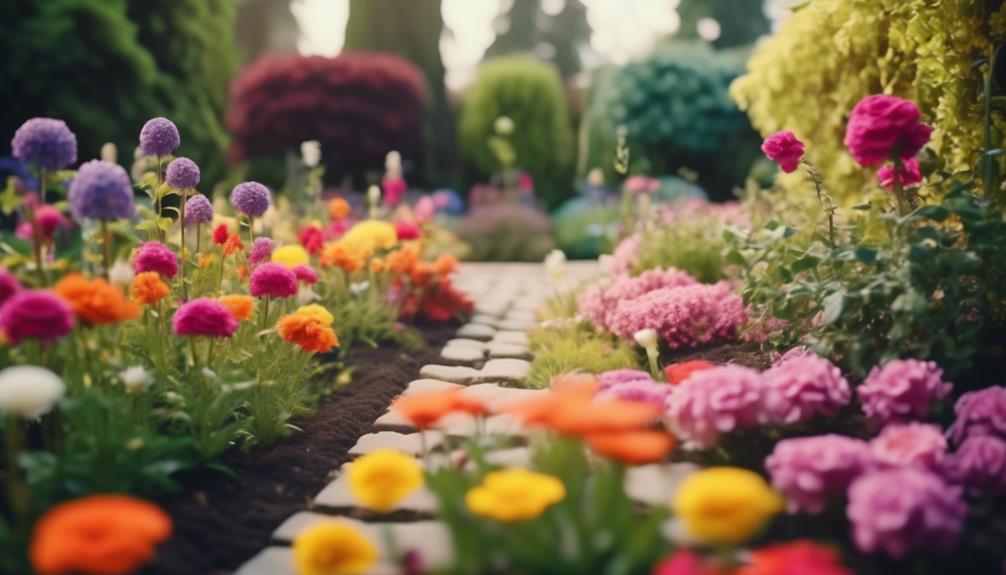What Is the Role of Personal Space in a Healthy Relationship?

So, you think personal space in a healthy relationship is just a frivolous concept and not worth discussing?
Well, let me tell you something, my friend. Personal space plays a crucial role in maintaining a strong and thriving relationship. It's not just about having some alone time or privacy; oh no, it goes much deeper than that.
In fact, it can be the key to building trust, fostering individual growth, and striking the perfect balance between togetherness and independence. But how exactly does personal space contribute to a healthy relationship?
Let's dive in and uncover the secrets, shall we?
Key Takeaways
- Personal space is essential in a healthy relationship as it allows individuals to maintain a sense of self and express themselves freely.
- Setting boundaries and respecting each other's autonomy promotes safety, trust, and respect within the relationship.
- Nurturing individual growth within a relationship is crucial for personal development and strengthening the bond between partners.
- Personal space enhances trust and communication by providing a safe space for open and honest conversations, leading to a deeper connection and better problem-solving.
The Importance of Personal Space
Personal space is crucial for maintaining a healthy and balanced relationship. It allows individuals to maintain their sense of self and foster self-expression. In a relationship, it's common for two people to spend a significant amount of time together, sharing their thoughts, emotions, and experiences. However, it's equally important for each person to have their own space and time to engage in activities that bring them joy and fulfillment.
Maintaining balance is essential in any relationship. By having personal space, you can ensure that each person has the opportunity to recharge and focus on their own needs. This helps prevent feelings of suffocation or dependency on the other person for happiness.
Additionally, personal space fosters self-expression. It allows individuals to pursue their own interests, hobbies, and passions. This not only contributes to personal growth but also adds depth and diversity to the relationship. When each person has the freedom to explore their own desires, they can bring unique perspectives and experiences to the relationship, enriching it in the process.
Defining Boundaries and Autonomy
To establish healthy boundaries and maintain autonomy within a relationship, it's crucial to clearly define and communicate your individual needs and expectations.
Defining boundaries involves identifying what's acceptable and respectful to you, and what's not. It's about recognizing your limits and communicating them effectively to your partner. This can include setting boundaries around personal space, time, and privacy, as well as emotional and physical boundaries.
By clearly defining these boundaries, you establish a sense of safety, respect, and trust within the relationship.
Maintaining autonomy is equally important. It means preserving your independence and individuality within the partnership. This involves making decisions for yourself and pursuing your own interests and goals.
It's about having a healthy balance between your personal life and your life as a couple. By maintaining autonomy, you ensure that you don't lose yourself in the relationship and that you continue to grow and develop as an individual.
Nurturing Individual Growth

By nurturing individual growth within a relationship, you can continue to cultivate your own personal development while also strengthening the bond with your partner. Fostering independence and promoting self-expression are key aspects of this process.
In any healthy relationship, it's important to recognize and respect each other's need for personal growth. This means allowing your partner the space and freedom to pursue their own interests, goals, and passions. By doing so, you not only encourage their individuality but also create a sense of trust and support within the relationship.
Promoting self-expression is also crucial for nurturing individual growth. Encourage your partner to openly communicate their thoughts, feelings, and desires. By actively listening and validating their emotions, you create a safe space for them to express themselves authentically. This not only helps them grow on a personal level but also strengthens the emotional intimacy between you.
Enhancing Trust and Communication
To enhance trust and communication in your relationship, it's important to establish boundaries that build trust.
By openly discussing and setting boundaries together, you can create a safe space where both partners feel respected and understood.
Additionally, maintaining open communication channels allows for honest and transparent conversations, fostering a deeper connection and strengthening trust between you and your partner.
Trust-Building Boundaries
Establishing healthy trust-building boundaries is crucial for enhancing trust and communication within a relationship. Creating these boundaries allows both partners to maintain their personal freedom while fostering a sense of security and respect.
Trust-building boundaries involve setting clear expectations and limits in terms of personal space, privacy, and individual needs. By openly discussing and establishing these boundaries, you and your partner can build a solid foundation of trust and understanding.
It's important to remember that trust is a two-way street, and both partners should feel comfortable expressing their needs and concerns. By respecting each other's boundaries, you can create an environment where both partners feel safe, heard, and valued.
This will ultimately enhance trust and communication, leading to a healthier and more fulfilling relationship.
Open Communication Channels
Building open communication channels is essential for enhancing trust and fostering effective communication within a healthy relationship. When you establish open lines of communication, you create a safe space for both you and your partner to express your thoughts, feelings, and concerns. This allows you to better understand each other and work through any challenges that may arise.
To strengthen your communication channels, consider the following:
- Active Listening: Show genuine interest in what your partner is saying, and listen without interrupting or judging. This helps create an atmosphere of respect and understanding.
- Expressing Yourself: Clearly communicate your own needs, desires, and boundaries. Honest and open expression allows your partner to understand and support you better.
- Balancing Privacy and Solitude: Recognize the importance of maintaining privacy and respecting solitude. Give each other space and time alone, understanding that it's healthy and necessary for personal growth.
Balancing Togetherness and Independence

Finding the right balance between togetherness and independence is crucial for a healthy relationship. It's important to establish boundaries that respect each other's need for personal space and individuality.
At the same time, it's also essential to foster a sense of interdependence and shared experiences to maintain a strong connection.
Boundaries in Relationships
Maintaining a healthy balance between togetherness and independence is crucial for establishing strong boundaries in a relationship. Boundaries serve as the foundation for a healthy and fulfilling partnership, allowing both individuals to express their needs and desires while respecting each other's individuality.
Here are three key points to consider when it comes to boundaries in relationships:
- Establishing healthy boundaries:
Setting clear boundaries helps define the limits and expectations within the relationship. It's important to communicate openly and honestly about what's acceptable and what's not, ensuring that both partners feel safe and valued.
- Respecting individual needs:
Each person in a relationship has unique needs and desires. It's essential to recognize and honor these individual needs, allowing each partner to have their own space, hobbies, and interests. Respecting individuality fosters a sense of independence and autonomy within the relationship.
- Balancing togetherness and independence:
Finding a balance between spending quality time together and having space for personal growth is essential. It's important to create a supportive environment that encourages both partners to pursue their own goals and passions while still nurturing the connection and intimacy between them.
Autonomy and Interdependence
Creating a healthy balance between togetherness and independence is crucial for fostering autonomy and interdependence in a relationship. Maintaining independence within a relationship allows you to have a sense of self, pursue personal goals, and nurture your own interests.
It's important to strike a balance between spending quality time together and having time for yourself. By doing so, you can avoid feelings of suffocation or losing your sense of identity.
Autonomy and interdependence go hand in hand, as they allow for personal growth while also nurturing the connection between you and your partner. Striving for this balance enables both individuals in the relationship to feel valued, respected, and fulfilled.
Avoiding Codependency and Resentment
To build a healthy relationship and maintain personal space, it's crucial to establish boundaries and foster individual growth. Avoiding codependency and resentment is essential in ensuring that both partners maintain their independence and avoid enmeshment. Here are some key points to consider:
- Recognize the signs of codependency: It's important to be aware of the signs of codependent behavior, such as excessive reliance on your partner for emotional support or feeling responsible for their happiness. Recognizing these signs can help you address and avoid codependent patterns.
- Set clear boundaries: Establishing clear boundaries is vital for maintaining personal space and preventing resentment. Communicate your needs, expectations, and limits to your partner, and be open to hearing theirs. Respecting each other's boundaries will foster a healthier dynamic in the relationship.
- Encourage individual growth: Supporting each other's personal growth and interests is crucial for maintaining independence. Encourage your partner to pursue their passions and interests, and make sure to prioritize your own personal development as well. This will enable both partners to have a sense of fulfillment outside of the relationship.
Cultivating a Stronger Connection

Nurturing a deeper connection is an ongoing process that requires active engagement and mutual effort from both partners. To cultivate a stronger connection, it's essential to create healthy boundaries and foster emotional intimacy within the relationship.
Healthy boundaries serve as a framework for individuals to express their needs, desires, and limits while respecting those of their partner. They provide a sense of safety and autonomy, allowing each person to maintain their individuality while also being part of a partnership.
Fostering emotional intimacy involves developing a deep understanding of each other's emotions, vulnerabilities, and dreams. It requires open and honest communication, active listening, and empathy. By creating a safe space where both partners feel comfortable expressing their emotions, fears, and joys, emotional intimacy can flourish. This deeper level of connection allows for a stronger bond, increased trust, and a greater sense of emotional support.
To cultivate a stronger connection, it's important to prioritize quality time together. This means actively engaging in activities that promote shared experiences, such as date nights, weekend getaways, or even just spending time talking and connecting on a daily basis. By dedicating time and effort to the relationship, both partners show their commitment to nurturing and deepening the connection.
Frequently Asked Questions
How Can Personal Space Contribute to a Healthier and More Fulfilling Relationship?
Having personal space in a relationship benefits your overall well-being. It allows you to recharge, reflect, and grow individually. Establishing boundaries ensures a healthier partnership, as it promotes respect, trust, and understanding between you and your partner.
What Are Some Examples of Healthy Boundaries and Autonomy Within a Relationship?
Setting boundaries and respecting individual needs are essential for a healthy relationship. It allows both partners to maintain their autonomy and personal space, fostering a sense of independence and self-fulfillment within the relationship.
How Can a Partner Support and Encourage the Individual Growth of Their Significant Other?
You can show support by nurturing hobbies and encouraging personal goals. Help your partner grow as an individual, fostering their interests and dreams. By doing so, you strengthen the bond and create a healthier relationship.
What Communication Strategies Can Couples Adopt to Build Trust and Maintain Open Lines of Communication?
To build trust and maintain open lines of communication, you can try active listening, expressing your feelings honestly, and practicing empathy. These communication strategies will help strengthen your bond and create a healthy relationship.
How Can Couples Strike a Balance Between Spending Quality Time Together and Maintaining Their Independence?
To strike a balance between quality time and independence, it's important to recognize that alone time benefits both individuals in a relationship. Finding a healthy balance means respecting each other's need for personal space while still nurturing your connection.











